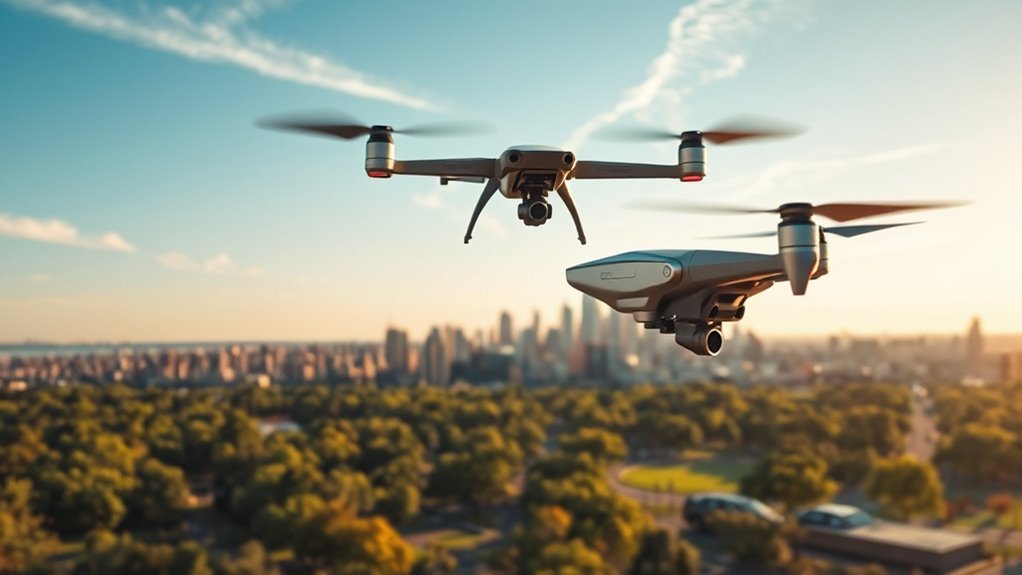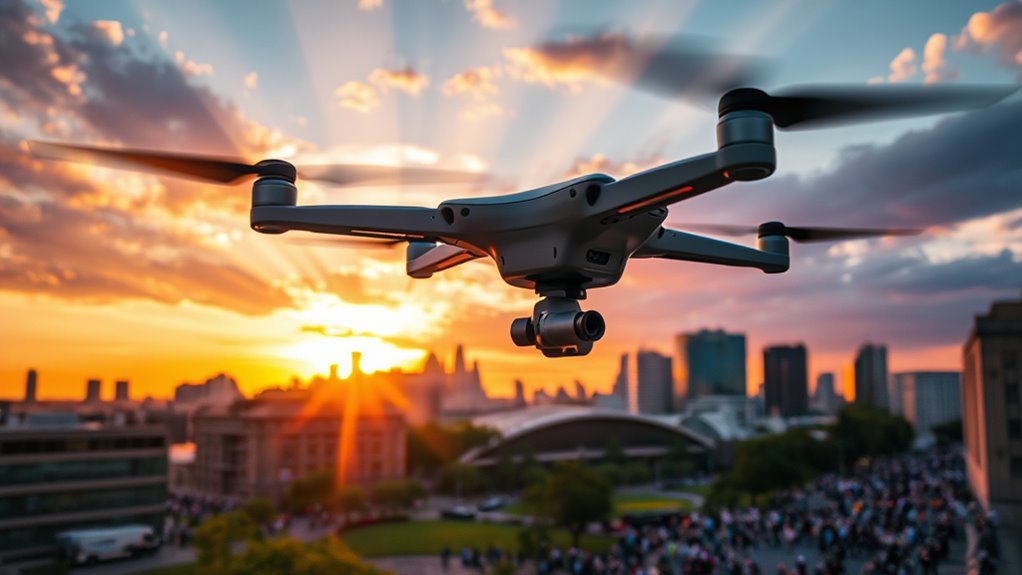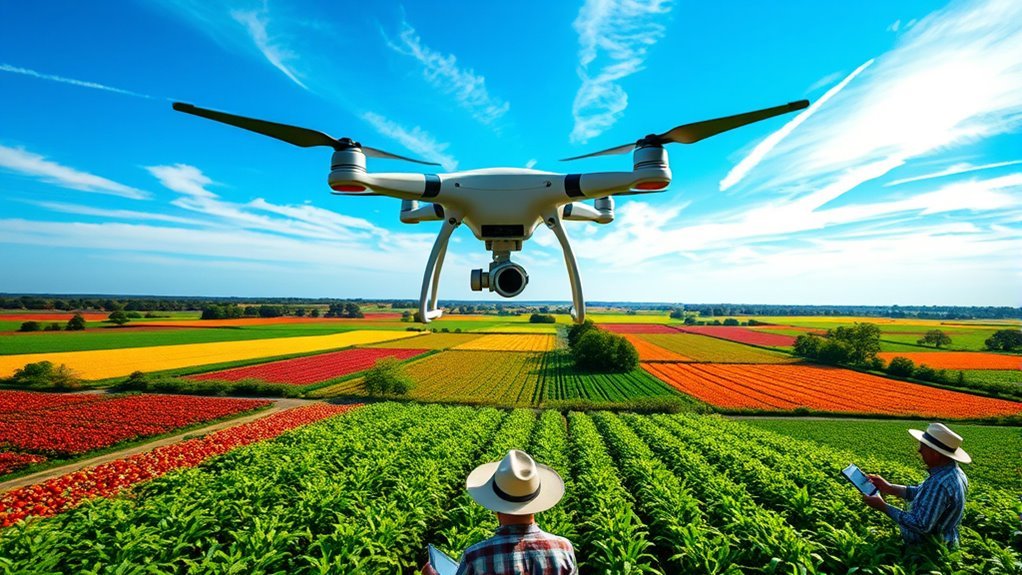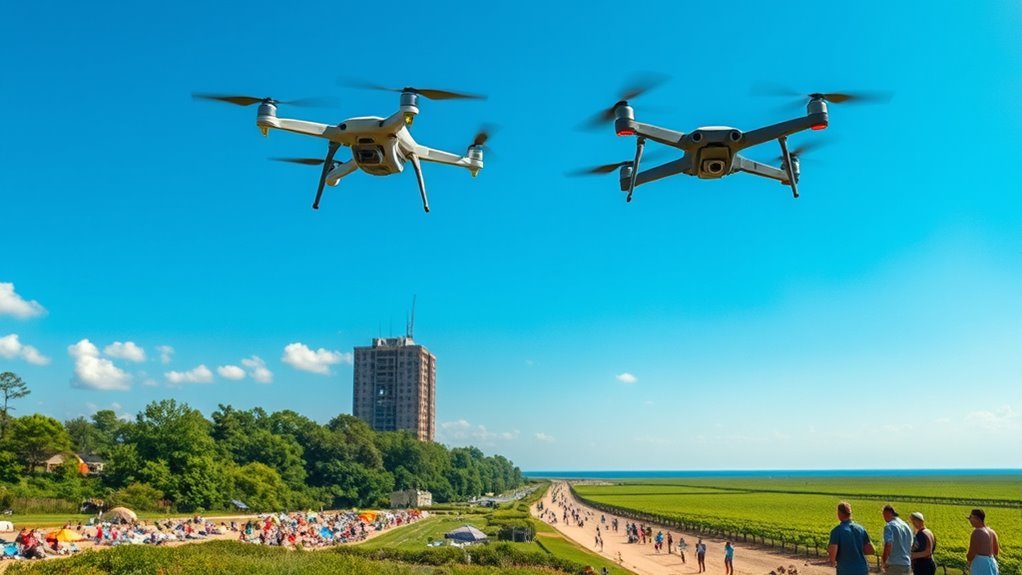Drones are still flying over NJ in 2025 due to their advanced delivery services that bypass traffic and guarantee timely shipments. They enhance emergency response with real-time surveillance and efficient medical supply transport. In agriculture, drones provide precise crop monitoring, maximizing yields while minimizing waste. Additionally, they offer effective infrastructure inspections, reducing human risk. Finally, drones play an essential role in environmental monitoring and conservation efforts. Discover more about each impact and how they’re transforming the landscape.
Enhanced Delivery Services

As demand for quick and efficient delivery continues to rise, drones are becoming an essential solution for enhancing delivery services in New Jersey. With their ability to navigate urban logistics seamlessly, drones can bypass traffic congestion, providing timely deliveries that traditional methods struggle to match. However, you must consider drone regulations that govern their operation, ensuring safety and compliance. These regulations are evolving, aiming to accommodate advancements in drone technology while protecting airspace. By integrating drones into existing logistics frameworks, businesses can optimize their supply chains, reduce costs, and increase customer satisfaction. This shift not only fosters innovation but also enhances your freedom to receive goods swiftly, revolutionizing how deliveries are perceived in densely populated areas like New Jersey. The Amazon MK30, with its advanced GPS and obstacle avoidance systems, exemplifies the cutting-edge technology driving this transformation. Additionally, the use of advanced sensors and collision avoidance systems in drones like the MK30 significantly enhances their reliability in urban environments.
Improved Emergency Response Capabilities

The integration of drones into logistics not only enhances delivery services but also significantly improves emergency response capabilities across New Jersey. These unmanned aerial vehicles play an essential role in disaster management, providing real-time surveillance during crises such as floods, fires, or accidents. You can observe how drones quickly assess affected areas, delivering critical information to first responders and decision-makers. Their ability to navigate challenging terrain guarantees that important resources reach those in need without delay. Additionally, drones can transport medical supplies or equipment to remote locations, further streamlining response efforts. By harnessing advanced technologies, New Jersey’s emergency services leverage drones to enhance situational awareness, ultimately fostering a more resilient and responsive community in times of need. Furthermore, drones deliver real-time data that empowers responders to make informed decisions swiftly and efficiently. This capability is crucial as advanced routing algorithms ensure that medical supplies are delivered efficiently during emergencies, optimizing response efforts.
Agricultural Advancements

While many may not realize it, drones are revolutionizing agricultural practices in New Jersey by offering innovative solutions that enhance productivity and sustainability. These unmanned aerial vehicles enable precise crop monitoring, allowing farmers to assess plant health and soil conditions with unprecedented accuracy. By utilizing advanced sensors and imaging technology, drones provide real-time data that supports precision agriculture, helping you make informed decisions based on specific field conditions. This targeted approach not only maximizes yield but also minimizes resource waste, aligning with sustainable farming practices. As you embrace these advancements, you’ll find that drones empower you to optimize operations, reduce costs, and improve overall crop management, ultimately fostering a more resilient agricultural sector in New Jersey. Additionally, drones equipped with multispectral sensors can detect subtle plant stresses for early interventions, further enhancing crop health management. Moreover, these technologies leverage AI pest detection for instant threat recognition, allowing for timely interventions that further bolster crop health and productivity.
Infrastructure Inspection and Maintenance
With the growing adoption of drones in agriculture, their applications are expanding into other essential sectors, including infrastructure inspection and maintenance. This shift is driven by advancements in drone technology and the necessity for efficient, cost-effective solutions in monitoring crucial infrastructures. You’ll find drones playing a pivotal role in:
The rise of drone technology is transforming infrastructure inspection, offering efficient and cost-effective solutions for critical monitoring tasks.
- Inspecting bridges and tunnels
- Monitoring power lines and pipelines
- Evaluating road conditions
- Conducting roof inspections
- Performing thermal imaging for energy audits
These tools not only enhance safety by reducing human risk in hazardous environments but also comply with evolving safety regulations. The precision and speed of drone inspections enable timely maintenance, fostering greater infrastructure resilience while promoting the freedom to innovate in inspection methodologies. Additionally, drones like the Elios provide advanced navigation capabilities that ensure safe operations in confined spaces, further improving inspection efficiency. Furthermore, the AI-driven stability of these drones allows for precise control, ensuring accurate assessments during inspections.
Environmental Monitoring and Conservation
As environmental challenges intensify, drones have emerged as essential tools for monitoring ecosystems and supporting conservation efforts. You can leverage drone technology for wildlife tracking, allowing for real-time data collection on species movements and population dynamics. This information is vital for developing effective conservation strategies. Drones also play a pivotal role in habitat restoration, enabling precise mapping of degraded areas, evaluating biodiversity, and monitoring recovery progress. With advanced sensors, you can capture high-resolution images and environmental data, helping you understand the impacts of climate change and human activity. By integrating drone capabilities into your conservation practices, you’re not just enhancing your efforts but also championing a more sustainable future, ensuring that nature thrives alongside human development. Additionally, advanced crop monitoring solutions provided by drones facilitate a comprehensive understanding of ecosystem health, further informing conservation strategies. These high-resolution imaging capabilities allow for timely detection of environmental changes that can impact both wildlife and plant health.
Frequently Asked Questions
What Regulations Govern Drone Operations in New Jersey in 2025?
In 2025, you’ll find drone operations in New Jersey governed by regulatory frameworks and operational guidelines. These rules guarantee safety, privacy, and airspace management, balancing technological advancement with individual freedoms and community concerns.
How Are Drones Impacting Local Wildlife in New Jersey?
Drones are altering habitats, disrupting ecosystems, and enabling species monitoring. You’ll see increased stress in wildlife, altered migration patterns, and potential declines in populations. Understanding these impacts is essential for balancing technological innovation and ecological preservation.
Are There Privacy Concerns With Drones Flying Over Residential Areas?
Yes, there’re valid privacy concerns with drone surveillance over residential areas. You’ve got to evaluate how these technologies might infringe on your privacy rights, potentially allowing unauthorized monitoring and data collection without your consent or knowledge.
What Are the Costs Associated With Drone Technology in New Jersey?
Imagine a soaring eagle; drone technology’s costs mimic its flight. Conducting a cost analysis reveals investment in this technology can be substantial, but the potential for innovation and freedom justifies the financial commitment for New Jersey’s future.
How Are Drones Affecting Jobs in Various Industries?
Drones are revolutionizing industries, enhancing efficiency and reducing costs. While job automation may displace some roles, it also creates opportunities for skilled workers, driving industry transformation and fostering innovation that ultimately supports job growth and economic freedom.

